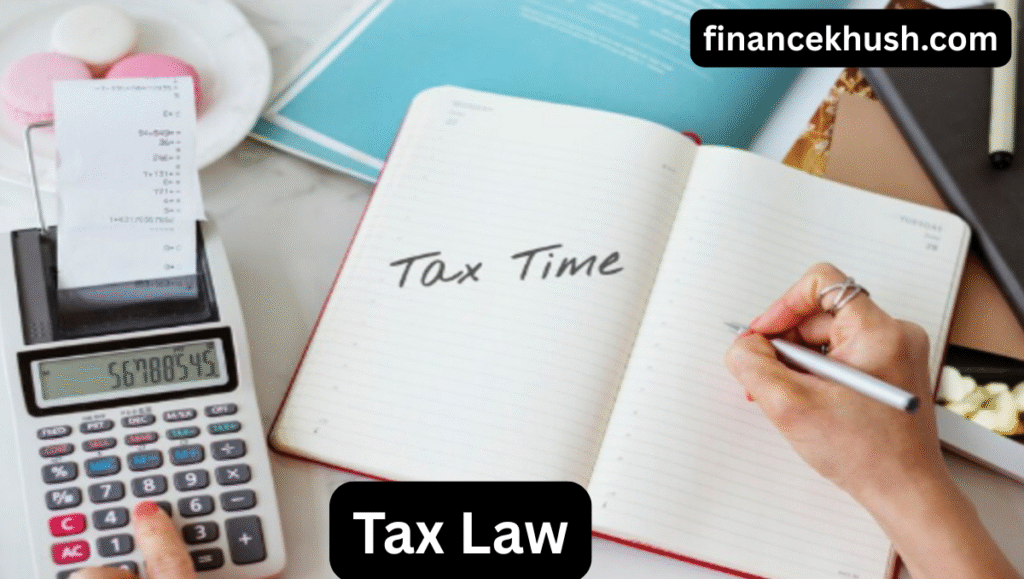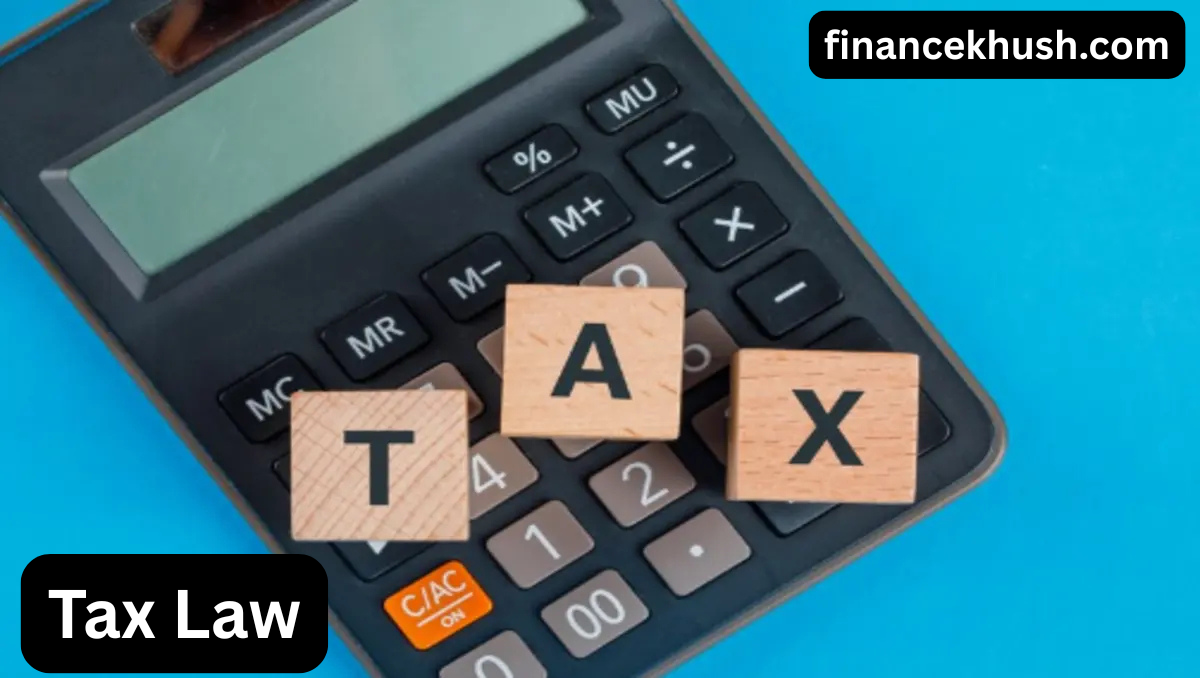Tax law can feel like a confusing maze. With all the jargon, rules, and ever-changing policies, it’s easy for anyone to get lost. Whether you’re a freelancer, small business owner, or simply someone trying to make sense of the taxes you’re paying, understanding tax law doesn’t have to be an overwhelming task.
In this blog post, we’re going to break down tax law in simple, easy-to-understand language. We’ll cover the basics, common misconceptions, and tips on how you can make sure you’re handling your taxes like a pro.
What is Tax Law?
Tax law refers to the rules, policies, and regulations that governments use to collect taxes from individuals and businesses. These laws are what determine how much you owe in taxes, when you need to pay, and the consequences for failing to do so.
Think of tax law as a guidebook on how the government collects money to fund things like infrastructure, education, healthcare, and public services. Without tax law, there would be no organized system to ensure that everyone pays their fair share to support society.
Why Should You Care About Tax Law?
You might be thinking, “I just pay my taxes and move on with my life.” And that’s perfectly okay! But understanding tax law a bit more deeply can actually help you in the long run.
- Save Money: When you understand the tax deductions, credits, and exemptions available to you, you can potentially save money on your tax bill.
- Avoid Penalties: Knowing the rules helps you avoid costly penalties for late filing or inaccurate tax returns.
- Better Financial Planning: If you’re running a business or planning for retirement, a solid understanding of tax law helps you make smarter financial decisions.
So, whether you’re an employee or a small business owner, it pays to understand tax law—no pun intended!
Key Tax Terms You Need to Know
Before diving into the details, let’s clear up some key terms you’ll often hear when dealing with taxes.
- Taxable Income: This is the income that’s subject to tax. It’s not just your salary but also other forms of income like freelance work, interest from investments, or rental income.
- Tax Bracket: This refers to the percentage of tax you pay based on your income level. In many countries, tax rates are progressive, meaning the more you earn, the higher the percentage you pay.
- Tax Deduction: These are expenses you can subtract from your total income, lowering the amount of income that’s taxed. Examples include mortgage interest or charitable donations.
- Tax Credit: Unlike deductions, which reduce your taxable income, tax credits directly reduce the amount of tax you owe. For example, a $1,000 tax credit will lower your tax bill by $1,000.
- Withholding: This is the amount of money your employer takes out of your paycheck and sends directly to the tax authorities on your behalf.

Types of Taxes You’ll Encounter
- Income Tax: The most common tax is income tax, which is imposed on the money you earn. Depending on your country, this could apply to your wages, business income, investment income, and more.
- Sales Tax: Sales tax is a tax placed on the sale of goods and services. When you buy something, you often pay this tax in addition to the price.
- Property Tax: If you own a home or other property, you’ll likely pay property taxes. These taxes are used to fund local government services like schools, emergency services, and road maintenance.
- Corporate Tax: Businesses also pay taxes on their income. Corporate tax is applied to a company’s profits.
- Social Security and Medicare Taxes: In many countries, employees and employers both contribute to social security and healthcare funds through payroll taxes.
- Estate Tax: This tax is levied on the transfer of wealth after someone’s death. If you inherit a large sum of money or property, you may need to pay estate taxes.
How Tax Law Affects Individuals vs. Businesses
Tax law affects both individuals and businesses, but the rules and regulations differ in several ways.
For Individuals:
The most common taxes individuals face are income taxes, sales taxes, and property taxes. If you’re an employee, you’ll likely have income tax automatically withheld from your paycheck. At the end of the year, you’ll file a tax return to calculate whether you owe more or are due for a refund.
For freelancers, self-employed individuals, or those with other sources of income, things can get more complex. You’ll need to handle your own tax filings and payments. The upside? There are often more deductions and credits available to you as a self-employed individual.
For Businesses:
Tax law for businesses is even more intricate. Whether you’re a sole proprietor, a partnership, or a corporation, you’ll need to know what deductions are available to you. Business owners often pay both corporate taxes and personal income taxes, depending on how the business is structured.
Some key tax benefits for businesses include deductions for things like office expenses, employee wages, and even business-related travel.
How to File Your Taxes (The Basics)
If you’re new to taxes, the process might seem a little daunting, but let’s walk through it.
1: Gather Your Documents
To file your taxes, you’ll need certain documents:
- W-2s (for employees)
- 1099s (for freelancers, contractors, or side income)
- Receipts and records of deductible expenses
- Bank statements or investment income records
2: Choose Your Filing Status
Your filing status depends on your situation. Common statuses include:
- Single
- Married Filing Jointly
- Married Filing Separately
- Head of Household
3: Fill Out the Tax Forms
In the U.S., the primary tax form is the 1040. For businesses, you might need additional forms depending on your structure.
For simple tax returns, many people use online platforms like TurboTax or H&R Block to guide them through the process.
4: Calculate Deductions and Credits
As we mentioned earlier, you can lower your taxable income through deductions, or reduce your actual tax bill with credits. Be sure to claim every possible deduction or credit you’re eligible for!
5: File Your Return and Pay Your Taxes
Once your forms are filled out and everything looks good, you’ll file your taxes. You’ll also need to pay any tax owed by the deadline, which is usually April 15th (in the U.S.).
If you’ve paid too much, you’ll receive a refund. If you owe, you’ll need to pay up, but there are options for installment payments if needed.
Common Tax Law Myths to Bust
There are a lot of misconceptions about tax law. Let’s clear up some of the most common ones:
1: Tax Law is Only for the Rich
You might think tax law only applies to wealthy individuals or corporations, but the truth is, everyone has to follow the rules. Whether you’re an employee or a freelancer, the tax system affects you. Even small deductions can make a big difference!
2: I Can’t Be Audited if I Don’t Have a Lot of Income
While it’s true that higher earners are more likely to be audited, the IRS can audit anyone. Even if you don’t make a lot of money, if your tax return raises any red flags, you could be audited.
3: Tax Deductions Aren’t Worth It
Some people think tax deductions are too complicated to bother with. But deductions are an excellent way to lower your taxable income. You don’t need to be an expert to take advantage of them—just make sure you keep track of your expenses.
Top Tax Tips for Individuals and Small Businesses
- Keep Good Records: Whether you’re self-employed or just managing your personal finances, keeping good records can save you a lot of headaches later. This includes receipts, bank statements, and documents for deductions.
- Take Advantage of Tax-Advantaged Accounts: Contributing to things like 401(k)s or IRAs can lower your taxable income while saving for retirement.
- Hire a Tax Professional: If you’re unsure about your taxes, especially as a business owner, hiring a tax professional can help ensure everything is filed correctly.
- Stay Informed: Tax laws change frequently, so make sure to stay up-to-date on any new tax laws or changes to existing ones. This could help you take advantage of new deductions or avoid penalties.

Conclusion
Tax law might sound complicated, but once you break it down, it’s not so scary. The key is to stay informed, keep good records, and ask for help when needed. By doing so, you can make the process much smoother and maybe even save yourself some money along the way.
At the end of the day, taxes are just a part of life. Understanding the basics of tax law can take the stress out of tax season and ensure that you’re doing what you need to do—without the headaches!
related post
Faq’s
1. What’s the difference between a tax deduction and a tax credit?
A tax deduction reduces your taxable income. For example, if you earn $50,000 and have a $5,000 deduction, you’ll only pay tax on $45,000. A tax credit directly lowers your tax bill. If you owe $2,000 in taxes and have a $500 credit, your bill drops to $1,500. Deductions reduce your income, while credits reduce your actual taxes owed.
2. Do I need to file taxes if I didn’t make much money?
Even if you didn’t earn a lot, you may still need to file taxes. Filing could lead to a tax refund if taxes were withheld from your paycheck. There are income thresholds that vary by country, so it’s worth checking or consulting a tax professional to see if you need to file.
3. How do taxes differ for self-employed people?
As a self-employed person, you’re responsible for both the employee and employer parts of Social Security and Medicare taxes. You’ll also need to track your business income and expenses, which could lead to deductions like office supplies or business travel. Plus, you’ll pay taxes quarterly, not just once a year. Keeping good records or hiring a tax pro can help.
4. Can I deduct expenses for my home office?
Yes! If you use part of your home exclusively for work, you can deduct related expenses like rent, utilities, internet, and office supplies. Make sure the space is used only for business. For example, if your office takes up 10% of your home’s space, you can deduct 10% of those expenses.
5. What if I make a mistake on my tax return?
If you spot a mistake, don’t panic. You can amend your return by filing a corrected form. If you owe more, you’ll need to pay the difference, plus possible penalties. If you paid too much, you could get a refund. It’s important to fix mistakes quickly to avoid future issues.
6. How can I avoid getting audited?
To minimize the chances of an audit, always file your taxes on time and ensure everything is accurate. Avoid claiming questionable deductions or underreporting income, even from side jobs. Being honest, transparent, and following the rules goes a long way in reducing audit risk.

1 thought on “Tax Law Secrets Every Taxpayer Needs to Know in 2025”